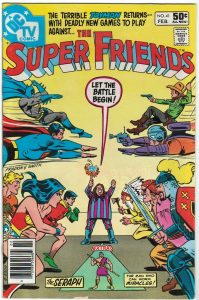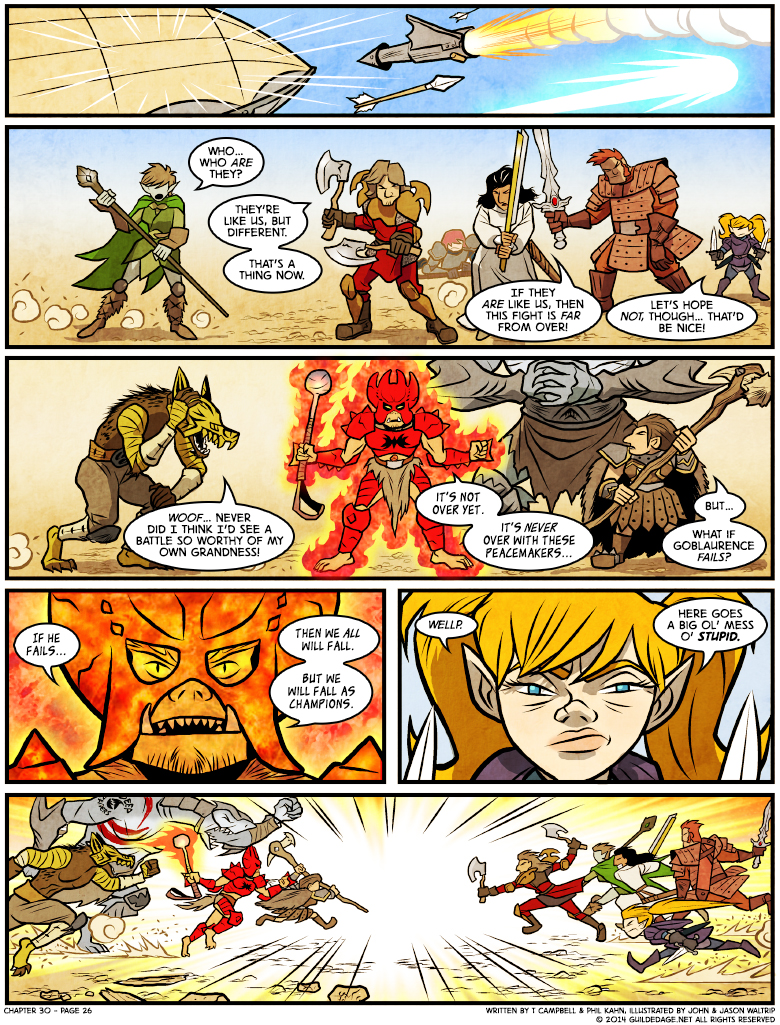Annotated 30-26
 To me, this page feels like vamping, just a bit. Some of the dialogue is fun, but Byron’s line makes me concerned that the dude hit his head when Hammerhead tripped him (there’s “endearing simplicity” and then there’s “baffling tautology”), Penk and Magda’s exchange tells us nothing that their last exchange didn’t, and Penk and Bandit finish off by competing to see who can give the least inspirational motivational speech (Bandit wins).
To me, this page feels like vamping, just a bit. Some of the dialogue is fun, but Byron’s line makes me concerned that the dude hit his head when Hammerhead tripped him (there’s “endearing simplicity” and then there’s “baffling tautology”), Penk and Magda’s exchange tells us nothing that their last exchange didn’t, and Penk and Bandit finish off by competing to see who can give the least inspirational motivational speech (Bandit wins).
We could, I think, have made more of the fact that Fr’Nj has apparently sundered or at least suspended her pacifistic vows to join the battle (we’d sort of “catch up” with that narrative thread later). As it is, this near-reset to the beginning of the fight is focused on confirming that both sides include a lot of persistent cusses who’ll just keep on fighting and fighting, even when it starts to get repetitive!
Which is in character, sure, but we probably could’ve guessed that already? What’s going on in Rana’s slow-moving sequence, anything interesti–











See, I find your comment about “vamping” really interesting because it demonstrates one of the issues I sometimes have with the way you tell stories. Namely that your instinct is to make every page absolutely JAM-PACKED with information. Often I have to read a page three or four times before I actually absorb everything.
Admittedly, that’s partly the appeal of your work, and I believe in economy of storytelling as much as the next guy, but I do think there’s such a thing as too much going on in one page. So to me, the fact that you’re slowing down and giving things a moment to breathe here is a good thing. It’s interesting to see how different your perspective is on this.
Considering the Five are not ever aware of them being “special”, “they’re like us, but different” feels super weird to me. To them, they’re just random adventurers that made a party and now work for the government. I don’t think they even consider themselves particularly good at fighting, they are just old hands at adventuring.
So I guess nobody has ever formed a party because and this group of “savages” is a party and… “that’s a thing now”.
Think we already meet that impasse with “What if the Savages gone and done it? What if they got them an US?” at the end of the last chapter (Ch. 20 Pg. 23) I agree it doesn’t seem very ‘working class adventurer’ in tone but it’s hard to balance that with the epic scope the story started to embodied while staying focused on our original protagonist without making them in the center of everything.
For the most part I agree with you.
However, there is some evidence in this series to suggest that the Peacemakers are regarded as not only a kind of special forces unit (employed when more rigid military action is insufficiently expedient), but also are regarded as significant morale boosters for the rank-and-file (see the start of this chapter).
If so, then they would be aware of themselves as a kind of intentionally attention-grabbing “figurehead” team. And, I would surmise they don’t think much of the concept, but if it pays the bills they’ll play along.
That the enemy would put forth a similar group however, may indeed seem baffling to them.
Rather, page 12 of chapter 29 (regarding the citation in parentheses)
I don’t think the Peacemakers have considered themselves “just a random party of adventurers” in…a very long time. If ever. (And in some cases, that’s a definite never; Frigg’s introduction to the others was all about how she considered herself very close to invincible, and Byron was the only one there who rose to her challenge.)
Right. Their very first trot out, scamming for some extra ralds to rescue Taro and co. felt working class, for sure. By the time they were scouting Souff Koral they were clearly at least “special agents on classified business.” And certainly being resurrected puts them above mere mortals.
This is the sense in which I read “an us.” A specifically picked and government funded party of all-stars. Which means, if anything, by this point in the first read through is when I stopped understanding the “working class” tagline, if not well before.
I still am not entirely sold on Bandit rushing headalong into a melee like that. Makes for a great visual, but it seems kind of weird to me. Yes, we’ve just witnessed Bandit stab Hammerhead something fierce, and yes, Bandit IS impulsive and reckless, but if you ask me, that worked mainly because she’s so tiny that she was beneath Hammerhead’s notice, and I’m sure that’s no longer the case (in the case of Hammerhead or any of the other Champions) I can buy her backstabbing her foes to great effect, but not going toe-to-toe with them
I thought that as well, but I’m even more surprised by Fr’nj.
I quite liked the “repetition”. By this point they’ve all had a serious tussle with the other team, used up some of their best moves. Sure it’s the same, but now . . . it’s personal! By which I mean, they know who and what they’re fighting. Each side understands that the stakes are high, that this isn’t fighting a hundred mooks with banter and style, and that they cannot back down under any circumstances.
The place is the same, but everything else has changed. I think it works
What if there was no dialogue on this page?